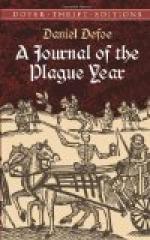Many persons, in the time of this visitation, never perceived that they were infected till they found, to their unspeakable surprise, the tokens come out upon them, after which they seldom lived six hours; for those spots they called the tokens were really gangrene spots, or mortified flesh, in small knobs as broad as a little silver penny, and hard as a piece of callus[264] or horn; so that when the disease was come up to that length, there was nothing could follow but certain death. And yet, as I said, they knew nothing of their being infected, nor found themselves so much as out of order, till those mortal marks were upon them. But everybody must allow that they were infected in a high degree before, and must have been so some time; and consequently their breath, their sweat, their very clothes, were contagious for many days before.
This occasioned a vast variety of cases, which physicians would have much more opportunity to remember than I; but some came within the compass of my observation or hearing, of which I shall name a few.
A certain citizen who had lived safe and untouched till the month of September, when the weight of the distemper lay more in the city than it had done before, was mighty cheerful, and something too bold, as I think it was, in his talk of how secure he was, how cautious he had been, and how he had never come near any sick body. Says another citizen, a neighbor of his, to him one day, “Do not be too confident, Mr. ——: it is hard to say who is sick and who is well; for we see men alive and well to outward appearance one hour, and dead the next.”—“That is true,” says the first man (for he was not a man presumptuously secure, but had escaped a long while; and men, as I have said above, especially in the city, began to be overeasy on that score),—“that is true,” says he. “I do not think myself secure; but I hope I have not been in company with any person that there has been any danger in.”—“No!” says his neighbor. “Was not you at the Bull Head Tavern in Gracechurch Street, with Mr. ——, the night before last?”—“Yes,” says the first, “I was; but there was nobody there that we had any reason to think dangerous.” Upon which his neighbor said no more, being unwilling to surprise him. But this made him more inquisitive, and, as his neighbor appeared backward, he was the more impatient; and in a kind of warmth says he aloud, “Why, he is not dead, is he?” Upon which his neighbor still was silent, but cast up his eyes, and said something to himself; at which the first citizen turned pale, and said no more but this, “Then I am a dead man too!” and went home immediately, and sent for a neighboring apothecary to give him something preventive, for he had not yet found himself ill. But the apothecary, opening his breast, fetched a sigh, and said no more but this, “Look up to God.” And the man died in a few hours.
Now, let any man judge from a case like this if it is possible for the regulations of magistrates, either by shutting up the sick or removing them, to stop an infection which spreads itself from man to man even while they are perfectly well, and insensible of its approach, and may be so for many days.




